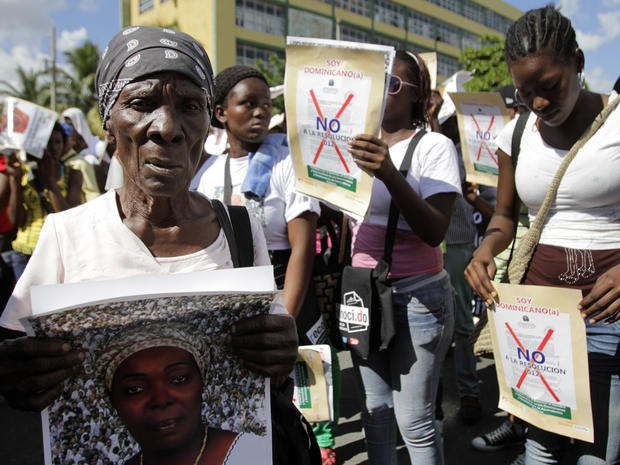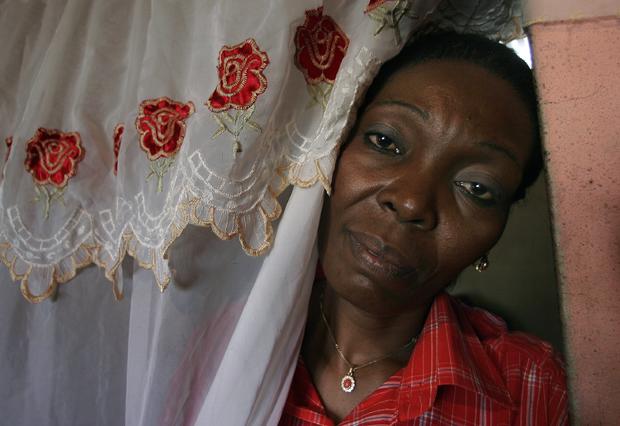Haitians see neighbors' post-quake love dry up
This story was filed by CBS News' Adriana Diaz.
(CBS) - Almost two years after a devastating earthquake inspired solidarity between the estranged neighboring nations which share the Caribbean island of Hispaniola, the relationship between the Dominican Republic and Haiti is descending back to business as usual.
"We have no value in the eyes of Dominicans," says Haitian construction worker Pierre Giraud, 24. Giraud snuck across the border into the Dominican Republic with the help of a smuggler after the 2010 earthquake destroyed his home, killing his parents.
Special section: Haiti, the Road to RecoveryAn estimated 1.2 million Haitians live in the Dominican Republic, making up roughly 10 percent of the country's population.
Many Haitians view their eastern neighbor as a land of opportunity, and many illegally cross the porous border to escape poverty - often to take low-paying jobs in construction, housekeeping, or cutting sugar cane. But many say they face discrimination and live in constant fear of being deported.
Mass deportations of undocumented Haitians have been a practice in the Dominican Republic for years.
However, when the January 2010 earthquake struck Haiti, the Dominican Republic suspended the deportations. This was just part of the solidarity that the Dominican Republic showed Haiti after the quake. The Dominican Republic was the first to send supplies and dispatch relief workers. Injured Haitians were air lifted to Dominican hospitals and the Dominican officials even opened the tightly controlled border, allowing thousands of Haitians to enter freely.
"The demonstration of solidarity and generosity was extraordinary and very moving," says Gonzalo Vargas Llosa, director of the United Nations agency on refugees (UNHCR) in the Dominican Republic. "But as time passed those demonstrations of candid solidarity, good will, and fraternal feelings started to diminish to some extent. Towards the end of last year and beginning of this year, the government restarted some deportations of undocumented Haitians."
According to NGOs, Dominican authorities periodically round up undocumented Haitians, some of whom overstayed work visas, and drop them at the Haitian border without due process.
Dominican political analyst Cristhian Jimenez says the renewed deportations are necessary to relieve some of the pressure illegal Haitians put on Dominican resources.
"18 percent of the budget of the Dominican Republic's Health Ministry goes to serve Haitians," says Jimenez. "There are more than a million Haitians here. The majority work, receive healthcare, their children go to school, and most of the money that they earn they send back to Haiti. So not only are we taking care of Haitians here, we are helping support Haitians that are in Haiti as well."
With Dominican elections approaching next year, the deportations may also serve a political purpose.
"[The deportations] tend to be given quite a lot of publicity," said Vargas Llosa of the UNHCR. "They give it visibly so the average Dominican person knows that the government is trying to take some action to stem the flow of undocumented Haitians."
Tensions have been further strained over questions about the citizenship status of children of undocumented Haitians.
"They're trying to erase us," said Sonia Pierre, a Dominican activist of Haitian decent and director of the Dominican-Haitian Women's Movement.
Thousands like Pierre, who were born in the Dominican Republic to Haitian parents, are at risk of having their Dominican citizenship revoked. Dominican citizenship is granted to all those born on Dominican territory. However, a 2007 law denies Dominican nationality to the children born to foreigners that are "in transit" in the country.
NOTE: After speaking to CBS News, Dominican-Haitian activist Sonia Pierre passed away suddenly on Dec. 4, 2011, due to natural causes. She was just 48.
The Dominican government applies "in transit" status to the country's illegal immigrants, most of whom are Haitian. Last year, the country's new constitution further specified that the children of illegal immigrants will not be granted Dominican citizenship.
"It's as if a grandchild or child of a Dominican born and raised in the U.S. was told by the U.S. government that they're not American because of a retroactive law," said Pierre. "Can you imagine that?"
Because of the policy, thousands have been denied Dominican birth certificates and national identity cards. These documents are required to enroll in university, marry, and apply for a passport in order to travel internationally.
Those affected are also at-risk of becoming stateless. Most have lived in the Dominican Republic all their lives and are not Haitian citizens, as Haiti does not recognize dual-citizenship.
Last week, hundreds of Haitians and Dominicans of Haitian decent gathered in front of the Dominican Supreme Court to protest the de-nationalization practices. One protestor held a sign that read, "I am Dominican, you know it."
Some call the de-nationalization practices institutionalized discrimination against Haitians.
"This is not happening to the children of Europeans, Chileans, or Colombians," said Pierre, the women's activist. "We share an island where one part is extremely poor and darker skinned. There is discrimination."
Resentment toward Haitians is deeply rooted in the island's history. In the mid-1800s, Haiti occupied the eastern part of the island for 22 years. The day Dominicans celebrate as their Independence Day is the day they broke free from Haiti in 1844, not their independence from Spain in 1821.
"What is taught in history classes in schools is Dominican independence from Haiti and that has become deeply entrenched in the mentality of Dominicans," said Jimenez.
Pierre is not convinced.
"A lot of people say discrimination against Haitians has to do with history. I don't think so," she says. "If that was the case, Dominicans would have the same attitude toward Spain and even the U.S., which occupied the Dominican Republic more recently."
Despite the controversy over de-nationalization, the Dominican government is making strides to unify the island. It partnered with the UNHCR to launch a tolerance campaign titled, "Living With Everyone Is Living With Tolerance."
The campaign kicked off on Friday with a free concert in Santo Domingo featuring prominent artists from both the Dominican Republic and Haiti. The concert, which coincided with Human Rights Day (December 10), was to be followed by events throughout the year promoting Dominican and Haitian culture.
"We thought this would be a good time to try to revisit some of that spirit and dynamic that was created after the earthquake, but this time not prompted by a tragedy, but to the contrary, this time prompted by... a positive and constructive spirit," said Vargas Llosa of the UNHCR.
Some of the names in this story have been changed to protect the identify of sources.

